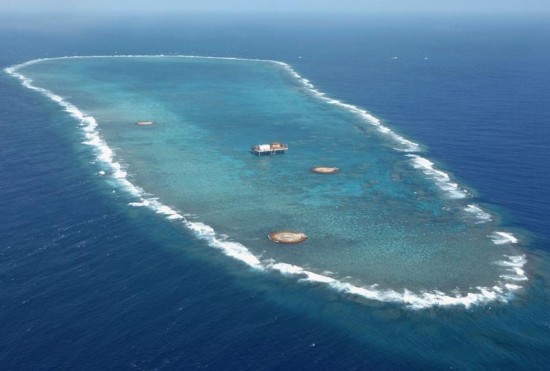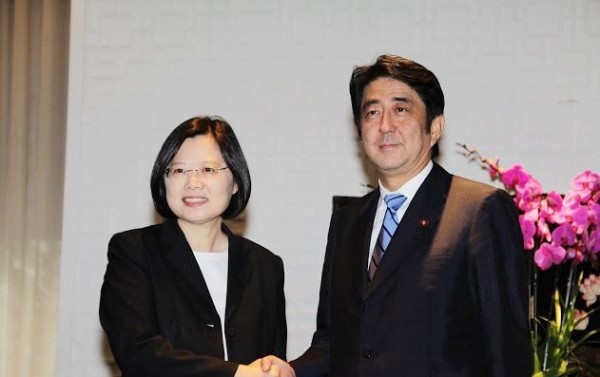by Brian Hioe
語言:
English
Photo Credit: China Times
EARLY FOREIGN policy moves by Tsai, roughly fifteen days into her term, appear aimed at improving ties with Japan by placing aside territorial disputes in the South China Seas. Nobuo Kishi, the younger brother of current Japanese prime minister Shinzo Abe and member of the Japanese Diet, visited Taiwan early in May to urge a solution to the dispute over fishing territories regarding the Okinotori islet.
Although only Japan claims Okinotori as its territory, Taiwan, South Korea, and China dispute the size of Okinotori claimed by Japan, with the view that because Okinotori is not island, it cannot generate an exclusive economic zone (EEZ). The size of the fishing waters around Okinotori would vary depending how Okinotori is defined. Thus, what is at stake would be fishing waters by Taiwanese and Japanese fishermen. This has led to incidents in the past between Taiwanese fishermen and the Japanese coast guard.
 The Okinotori Islet. Photo credit: People.cn
The Okinotori Islet. Photo credit: People.cn
Late during the Ma administration, the Ma administration made disputed South China Seas islands claimed by Taiwan a hotbed issue, even when this seemed like counterintuitive foreign policy. This was popularly seen as the Ma administration attempting to sabotage the foreign policy of the incoming Tsai administration and boost its popularity among the deep Blue camp, which places a large ideological weight upon defending Taiwan’s claims of sovereignty over island territories.
The dispute about the territorial waters surrounding Okinotori was raised as part of this, with Ma taking the stance that he was defending the fishing rights of Taiwanese fishermen. The anti-Japanese animus of deep Blue ideology was likely another factor, since taking a stance against Japan would probably be a popular one within the deep Blue camp. The deep Blue camp retains an anti-Japanese animus due to its Chinese nationalism and the history of the Japanese occupation of China.
 A meeting between Tsai and Abe in 2011. Photo credit: Liberty Times
A meeting between Tsai and Abe in 2011. Photo credit: Liberty Times
Nevertheless, it appears that the Abe administration chose to disregard the Ma administration’s attempts to damage relations between Taiwan and Japan, with the view that the Tsai administration might take a different stance. This appears to have paid off. The Tsai administration is notably close to the Abe administration. Tsai visited Japan during the lead-up to 2016 elections, in October 2015, meeting Nobuo Kishi in an official capacity and with rumors of a clandestine meeting with Abe that also took place. Tsai is seen as seeking closer ties between Taiwan and Japan in order to counter China. During past presidential races in which Tsai ran for presidency, Tsai also visited Japan.
The animus of KMT ideology against Japan aside, Taiwan is well-known for positive views of Japan, as we see in the outpouring of relief efforts after the Kumamoto earthquake in April. In kind, with the influx of Taiwanese aid after the 2011 Fukushima earthquake, Japan has held positive views of Taiwan, large amounts of disaster aid coming in after the earthquake in Tainan in February. It is notable that immediately after taking office, Tsai’s first steps were to try to restrengthen ties with Japan.
Tsai’s cornerstone for foreign policy is the much-vaunted “New Southwards Policy,” which calls for building stronger economic ties with Southeast Asian countries in order to wean Taiwan off of trade dependency with China. But though some new policy has been announced regarding visas for visitors from Southeast Asian countries, Tsai likely is not in a position to build ties with Southeast Asian countries right away. Vietnam, for example, is presently in the middle of political turmoil due to protests against the mass die-offs of fish as a result of the actions of Taiwanese-owned Formosa Steel, with backlash not only against the company, but against poor government handling of the disaster. Likewise, the Philippines is presently also in a state of political transition, with much uncertainty of what the actions of unorthodox politician Rodrigo Duterte will be as president of the Philippines. In the case of both Vietnam and the Philippines, Tsai may be sitting it out until a more stable period, in order to build ties with both countries. What actions Tsai will take to build ties with other Southeast Asian countries, as well as with South Korea, remain to be seen.
However, in the case of not only Tsai’s attempts at alliance with Japan, but with Southeast Asian countries, it remains that Tsai’s foreign policy is actually straightjacketed by the ROC framework she must adhere to as president. When pressed, Tsai has had to defend the territorial claims of the ROC over disputed South China Seas territories in the past. The KMT will likely use this as a strategy to undercut Tsai’s attempts to build ties with countries in a fashion that will allow Taiwan counteract China.
And Tsai is legally obligated in her position as president of the ROC to defend Taiwan’s territorial claims over South China Seas territories, even if this is counterproductive for such foreign policy. If it is that Shinzo Abe’s administration has demonstrated that it is willing to pragmatically overlook Taiwan’s territorial disputes with Japan for the sake of building relations, also with the aim of counteracting China, it is possible that Tsai will at some point be forced into a position where she must unwillingly defend Taiwan’s territorial claims in a fashion that the Abe administration cannot overlook. Notably, as a administration which rode into power with the strong backing of the Japanese nationalist right-wing, the Abe administration is also beholden to its support base.
Rather like the KMT—one of many parallels between the Abe administration and the KMT, in fact—the defense of island territories claimed by Japan also has an ideological weight for the Japanese nationalist Right. There may come a day in which popular outcry from the Japanese nationalist right-wing over Taiwan’s continued territorial claims over disputed South China Seas islands also claimed by Japan may lead to backlash against Taiwan from the Japanese nationalist Right—and this may override the Abe administration’s ability to pragmatically overlook Taiwan’s claims as part of its foreign policy aimed at counteracting China. In this way then, does this return to the juridical existence of the ROC framework as a straightjacket which undercuts not only Tsai’s domestic, but also foreign policy.

